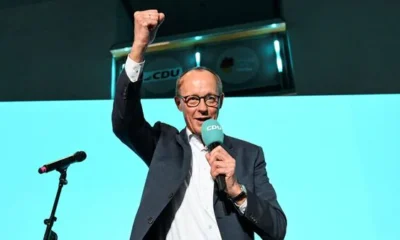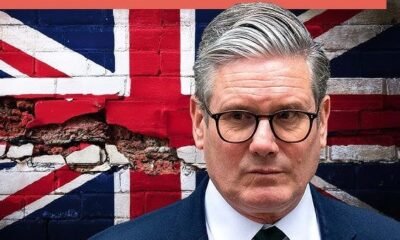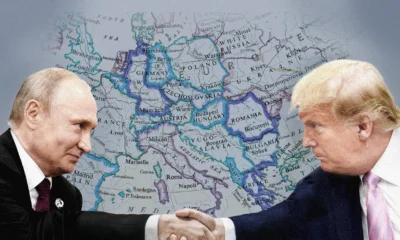Opinion
Is Ukraine Now Stuck In The US-Russia Ecosystem? Could Zelensky Have Made A Deal To Stop The War, Is Trump Right?
Published
1 year agoon

The headlines have been rolling in at an almost dizzying pace—Ukraine, Russia, and the present mediator, the United States.
Donald Trump has been known for creating controversies, and his latest remarks about the Ukraine war are no exception. Initially, he publicly snubbed Ukraine’s President Volodymyr Zelenskyy, suggesting that “Ukraine should have never started it.”
That remark alone sent shockwaves across political circles. But in a quick reversal, Trump admitted in a recent interview that Russia did indeed invade Ukraine on Vladimir Putin’s orders. However, he didn’t miss the opportunity to add that both Zelenskyy and then-U.S. President Joe Biden should have prevented it from happening. “They shouldn’t have let him attack,” he remarked.
His initial claim that Ukraine was responsible for the war sparked outrage both domestically and internationally. And while his later acknowledgment of Russia’s role might have seemed like a correction, the damage was already done.
And it doesn’t look like its stopping…

Starlink. Ukraine’s North Star And the Precious Minerals
Beyond the political back-and-forth, a new revelation has added fuel to the fire – The U.S. has reportedly threatened to cut off Ukraine’s access to Starlink satellite internet terminals if Kyiv does not sign a minerals deal with Washington. As per most recent reports, U.S. and Ukrainian officials are currently negotiating revised terms after Zelenskyy refused to sign the initial proposal.
Why does this matter? Because Starlink is the lifeline of Ukraine’s wartime communications. With approximately 42,000 terminals in operation across military units, hospitals, businesses, and aid organizations, losing access to the system would be a devastating blow. “Ukraine runs on Starlink,” a source said. “Losing it would be catastrophic.”
The deal initially proposed by the U.S. Treasury Secretary Scott Bessent sought a 50% stake in Ukraine’s critical mineral resources—including oil, gas, and rare earth metals—without offering Ukraine any concrete security guarantees. Zelenskyy’s refusal to sign the deal triggered the first round of Starlink shutdown threats.
And just when things couldn’t get more complicated, U.S. Special Envoy Keith Kellogg reportedly reiterated the threat in a meeting with Zelenskyy and other Ukrainian officials on Feb. 20. The message loud and clear – No minerals deal, no Starlink.
Elon Musk—whose company SpaceX owns Starlink—has also been making headlines.
Musk, now playing an advisory role under Trump’s directive to eliminate “fraud” and “waste” from government spending, has been increasingly vocal in criticizing Ukraine—shutting down USAID, the organization that provides crucial humanitarian aid to Ukraine, and has even amplified Russian disinformation while mocking Zelenskyy’s leadership.
Trump’s “Very Good Talks”. No Roll for Zelenskyy
US President Donald Trump ramped up his criticism of Ukrainian President Volodymyr Zelensky again on Friday, downplaying his importance in negotiations to end the Russia-Ukraine war. Trump claimed he had “good talks” with Russian President Vladimir Putin but not with Ukraine, as the US pushes for an end to the three-year conflict.
Trump’s remarks that Zelensky was a “dictator with elections,” a jab made after the Ukrainian leader criticized being left out of US-Russia discussions, he fired up again.
“I don’t think he’s very important to be in meetings,” Trump said in an audio interview with Fox News. “He’s been there for three years. He makes it very hard to make deals.” He further argued that Ukraine had no leverage in negotiations, saying, “They don’t have any cards, but they play it tough. But we are not going to let this continue.”
During a gathering of US governors at the White House, Trump reiterated, “I’ve had very good talks with Putin, but not such good talks with Ukraine.” Meanwhile, Russian and US officials recently met in Saudi Arabia to discuss a ceasefire—without inviting Ukraine.
Trump Criticizes Macron and Starmer
In his broadside, Trump also took aim at French President Emmanuel Macron and British Prime Minister Keir Starmer, both of whom are expected to visit the White House soon. He accused them of doing little to end the Russia-Ukraine war.
Macron responded on Friday, saying he would remind Trump that “you can’t be weak with President Putin.” Meanwhile, British Liberal Democrat leader Ed Davey accused Trump of orchestrating a “stitch-up” with Putin that would “amount to a betrayal of Ukraine.” He urged Starmer to confront Trump openly during their meeting.
With tensions high and negotiations still in flux, Trump’s latest statements have only added to the uncertainty surrounding the future of US-Ukraine relations.

Could Zelensky Have Made a Deal to Stop the War?
Truth is often far more complicated and the ongoing Russia-Ukraine war, now stretching into its third year, is no exception.
U.S. President Donald Trump recently made headlines by claiming that Ukrainian President Volodymyr Zelensky could have prevented the war altogether.
The Forgotten 2019 Peace Deal
Few people recall that Zelensky was elected in 2019 with a landslide 73% of the vote, largely on the promise of bringing peace with Russia. His campaign revolved around ending Ukraine’s internal divisions, particularly concerning language and regional identity, and reintegrating the breakaway Donetsk and Luhansk regions.
At that time, the Kremlin was still publicly committed to the idea of Donbas remaining part of Ukraine—albeit under a new constitutional framework that would give the region significant autonomy and, crucially, a veto over Ukraine’s geopolitical alliances. This was Moscow’s way of ensuring Ukraine stayed out of NATO.
Zelensky’s predecessor, Petro Poroshenko, had dragged his feet on implementing the 2014 and 2015 Minsk Agreements, which called for referendums in the breakaway territories. But Zelensky, determined to make peace, pushed ahead with negotiations. By late 2019, he had secured an agreement for a referendum that would have given Donbas residents a choice – rejoin Ukraine under pre-2014 conditions or return under a new, self-governing status. The deal, brokered with oversight from the OSCE, could have changed the course of history.
The Deal That Never Was
While the agreement was met with cautious optimism from international observers, it faced intense resistance at home. Ukrainian ultranationalists, particularly hardline militias like the Azov Battalion, saw the deal as capitulation to Russia.
Protests erupted in Kyiv under the slogan “No Capitulation!” The situation quickly escalated when militia leaders, including Andriy Biletsky of the National Corps, outright rejected the agreement. Zelensky attempted to persuade them, even meeting personally with some leaders to discuss surrendering their unregistered weapons in exchange for peace. They refused, and the deal unraveled.
With the referendum scrapped, any realistic hope of reintegrating Donbas without further bloodshed vanished. By the time Zelensky and Putin met in Paris in December 2019, Moscow had lost faith in Kyiv’s ability to deliver on its commitments. Zelensky’s insistence that Ukraine would still seek NATO membership only reinforced Putin’s fears. From that moment, Russia’s path to full-scale invasion seemed almost inevitable.
Who Really Derailed Peace? So, was Trump right?
Well, sort of—but not in the way he thinks.
Yes, there was an opportunity to prevent the war back in 2019. Yes, Zelensky was willing to make a deal. And yes, had it succeeded, Russia might not have found an excuse for its later invasion. But the collapse of the peace deal wasn’t Zelensky’s fault. If anything, he was the only major political figure actively trying to avert war. The real blame lies with the ultranationalist factions within Ukraine that torpedoed the referendum and with Western allies who underestimated the long-term consequences of failing to support Zelensky’s efforts.

The Last Bit
In hindsight, the failure of the 2019 peace deal was a turning point. Could it have genuinely stopped the war? Possibly. Would it have come at the cost of Ukraine’s NATO ambitions and the effective loss of Crimea? Almost certainly. Would it have been worth it? That’s the uncomfortable question few are willing to answer.
While Zelensky has since become the face of Ukraine’s defiance, it’s worth remembering that his first instinct was to prevent war, not fight one. Unfortunately, history had other plans, and Ukraine—and the world—is now paying the price.
This brings us to the big question—could Zelensky have made a deal to stop the war as Trump has remarked?
The bottom line is that while some may argue that a diplomatic resolution early on—perhaps with U.S. mediation—could have avoided the prolonged conflict. But with Russia’s aggressive stance, Ukraine’s firm resistance, and America’s shifting interests, the situation was never that simple.
Zelenskyy has consistently maintained that Ukraine will not trade its sovereignty for peace. The U.S., on the other hand, appears to be playing both sides—supporting Ukraine on the battlefield (under Biden) and now under Trump—using its vulnerabilities as leverage in negotiations over natural resources.
And then there’s the Putin factor. Even if Ukraine had made certain concessions, would Russia have honored them? Many believe that any agreement made without ironclad security guarantees from the West would have only delayed further aggression.
Lets call out the fact, the war in Ukraine is no longer just about land or politics—it’s about control, influence, and economic interests. The U.S.-Ukraine minerals deal is just another example of how global powers are playing chess with a war-torn nation as the board.
Ukraine is not just fighting Russia; it’s caught in a complex geopolitical ecosystem where deals, threats, and shifting alliances are as much a part of the battle as the bullets on the front lines.

You may like
-


Taiwan’s ‘Historic’ TSMC Deal, A Win Or The End Of Its ‘Silicon Shield’ As China Threatens? A Jittery Taiwan Watches Trump’s Moves On Ukraine, Wondering, Could We Be Next?
-


America And China’s Thirst For Gold In 2025 Is Draining Other Countries’ Reserves; Here’s Why?
-


Germany’s Friedrich Merz’s Big Balancing Act—Trump, Borders & Europe’s Future. Can He Deliver?
-


United Kingdom To Unleash Its ‘Harshest’ Sanctions On Russia Yet—But Will They Bite? How Trouble Is Brewing For Keir Starmer At Home. Shamed For Volunteering British Troops In Ukraine
-


How It’s Not Trump But Vladimir Putin That Europe Is Stinging From: Trump’s U-Turn On Europe, Russia’s Strong Supply Chain—A Formidable Opponent!
-


Why Is Donald Trump Still Reiterating $21 Million USAID Funding To India, Although It Went To Bangladesh? What Game Is Trump Playing And Why?